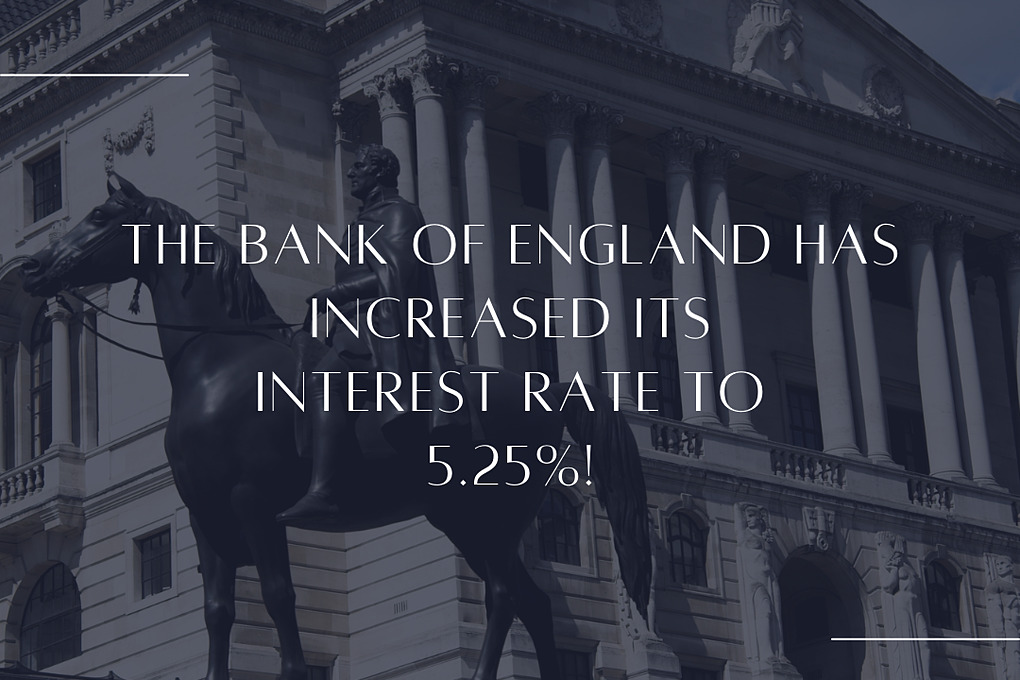Bank of England Signals Prolonged Higher Interest Rates Amidst Soaring Inflation

- Aug 3rd 2023
In a bid to combat surging price increases, the Bank of England has declared that interest rates will remain higher for an extended period—the first time such a tactic has been employed. The Bank has taken this action while raising rates from 5% to 5.25%, marking the highest borrowing costs in 15 years. Although this move is expected to result in higher mortgage and loan payments, it also offers the potential for increased savings rates.
The primary objective of this approach is to address the mounting cost of living, with the Bank now being more cautious about the nation's economic growth. Despite this, they predict that the UK will avoid a recession. The Bank's decision signals a commitment to maintain elevated interest rates until UK inflation, measured by the rate at which prices rise, is brought under control.
Bank of England governor, Andrew Bailey, emphasised the importance of curbing inflation as it disproportionately impacts the most vulnerable segments of the population. He stated that the Bank would ensure interest rates remain "sufficiently restrictive for sufficiently long" until inflation reaches the target level of 2%.
Despite past inaccuracies in inflation forecasts—six out of the last eight were overly optimistic—Mr. Bailey is now more confident in the Bank's prediction of a decrease in inflation. He also commended the resilience of the UK economy and its historically low unemployment rates.
The current interest rate rise marks a significant shift from the situation before December 2021, when rates remained under 1% for over 13 years. The Bank's approach going forward will be influenced by factors such as the job market and wage growth. Notably, private sector pay has risen more than anticipated in recent months, impacting the inflation trajectory.
The Bank's strategy in raising interest rates is aimed at curbing consumer spending and making borrowing more expensive. However, amidst pandemic recovery, some business owners like Jo Bevilacqua, a Peterborough hair salon owner, express concern over its impact on consumer spending. For small businesses, reduced consumer spending threatens their livelihoods, making the rate hike a "hard pill to swallow."
The path of inflation in the coming years will depend heavily on the job market and wage trends. Nevertheless, the Bank of England remains steadfast in its efforts to stabilise the economy and bring inflation back within its target range. As the situation unfolds, businesses and individuals alike must navigate the financial challenges and opportunities presented by the prolonged higher interest rates.
As interest rates rise, the overall cost of borrowing money may continue to climb, prompting concerns about how it will affect mortgages. For individuals, it's essential to assess their individual circumstances to understand the direct impact of this change or whether they may start feeling the difference when their current mortgage term concludes.
For those on a fixed-rate mortgage, there will be no immediate impact on their monthly repayments during the fixed period. However, when the time comes to remortgage, they may face a significant increase in the monthly repayment amount due to the higher interest rates prevailing in the market.
On the other hand, individuals with variable-rate tracker mortgages linked to the Bank of England's base rate will experience an immediate effect on their repayment amounts, as these mortgages are directly tied to the Bank of England's rate changes.
For those on their lender's Standard Variable Rate (SVR), the impact will depend on the decision of their lender. They may see a rise in their monthly repayments as the lender adjusts the SVR in response to the higher interest rates set by the Bank of England.
With the possibility of further interest rate increases, it is crucial for homeowners to monitor the situation closely and evaluate their financial options. Exploring remortgage opportunities at favourable rates may be beneficial for those on fixed-rate mortgages nearing the end of their term or those on variable-rate tracker mortgages. Careful consideration and planning will help individuals navigate these changes and ensure they are prepared to manage their mortgage effectively in the face of rising interest rates.








